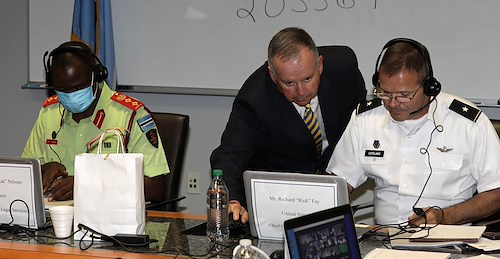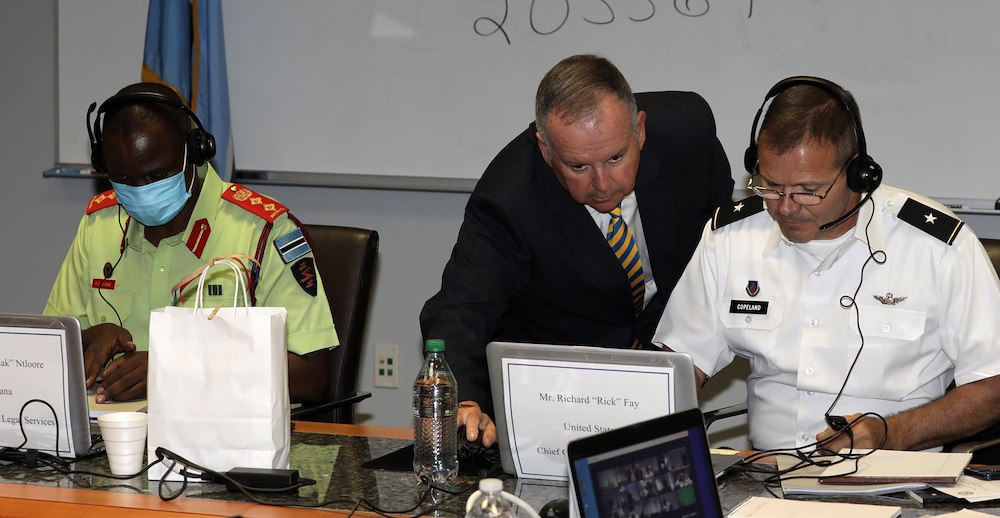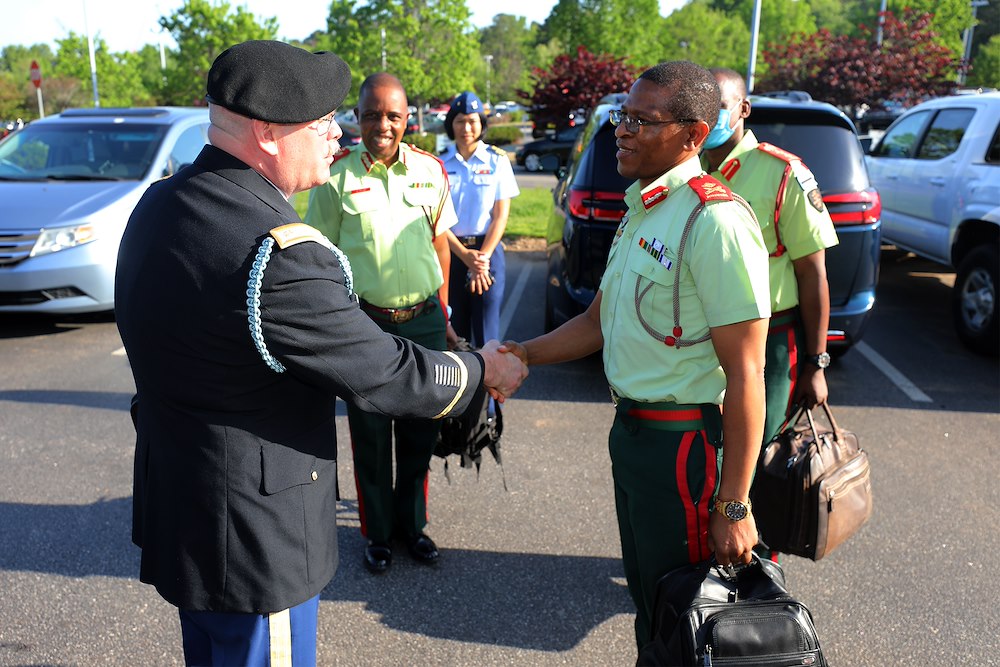Gallery contains 11 images
×
Photo 1 of 11
North Carolina National Guard
North Carolina National Guard leader U.S. Army Brig. Gen. Jeffery Copeland, the NCNG Director of Joint Staff, right, and retired Col. Rick Fay, NCNG Chief Counsel, listen to legal experts via translators at the African Military Law Forum Advisory Council at NCNG Joint Force Headquarters in Raleigh, North Carolina, April 26 - 28, 2022. The conference, created by the United States Africa Command, brought African military legal advisors from several nations including Botswana, one of the NCNG State Partnership Program peers, and Nigeria, Cameroon, Namibia, Burkina Faso, Uganda, Tunisia, Niger, Malawi, Burundi, and NCNG leaders to share their expertise in International, Operational, Administrative, and Civil law and to announce the formation of the Women’s Peace and Security component to the ongoing forum.
Photo by: Sgt. 1st Class Robert Jordan
Photo 2 of 11
North Carolina National Guard
Sandra Franzblau, Office of the Legal Counsel, United States Africa Command, addresses legal experts at the North Carolina National Guard hosted African Military Law Forum Advisory Council at NCNG Joint Force Headquarters in Raleigh, North Carolina, April 26 - 28, 2022. The conference, created by AFRICOM, brought African military legal advisors from several nations including Botswana, one of the NCNG State Partnership Program peers, and Nigeria, Cameroon, Namibia, Burkina Faso, Uganda, Tunisia, Niger, Malawi, Burundi, and NCNG leaders including U.S. Army Brig. Gen. Jeffery Copeland, the NCNG Director of Joint Staff and retired Col. Rick Fay, NCNG Chief Counsel, to share their expertise in International, Operational, Administrative, and Civil law and to announce the formation of the Women’s Peace and Security component to the ongoing forum.
Photo by: Sgt. 1st Class Robert Jordan
Photo 3 of 11
North Carolina National Guard
Cameroon Armed Forces Col. Marguerite Meffand-Loaw addresses fellow legal professionals at the North Carolina National Guard hosted African Military Law Forum Advisory Council at NCNG Joint Force Headquarters in Raleigh, North Carolina, April 26 - 28, 2022. The conference, created by the United States Africa Command, brought African military legal advisors from several nations including Botswana, one of the NCNG State Partnership Program peers, and Nigeria, Cameroon, Namibia, Burkina Faso, Uganda, Tunisia, Niger, Malawi, Burundi, and NCNG leaders including U.S. Army Brig. Gen. Jeffery Copeland, the NCNG Director of Joint Staff and retired Col. Rick Fay, NCNG Chief Counsel, to share their expertise in International, Operational, Administrative, and Civil law and to announce the formation of the Women’s Peace and Security component to the ongoing forum.
Photo by: Sgt. 1st Class Robert Jordan
Photo 4 of 11
North Carolina National Guard
Members of the African Military Law Forum Advisory Council pose at the North Carolina National Guard hosted at NCNG Joint Force Headquarters in Raleigh, North Carolina, April 26 - 28, 2022. The conference, created by the United States Africa Command, brought African military legal advisors from several nations including Botswana, one of the NCNG State Partnership Program peers, and Nigeria, Cameroon, Namibia, Burkina Faso, Uganda, Tunisia, Niger, Malawi, Burundi, and NCNG leaders including U.S. Army Brig. Gen. Jeffery Copeland, the NCNG Director of Joint Staff and retired Col. Rick Fay, NCNG Chief Counsel, to share their expertise in International, Operational, Administrative, and Civil law and to announce the formation of the Women’s Peace and Security component to the ongoing forum.
Photo by: Sgt. 1st Class Robert Jordan
Photo 5 of 11
North Carolina National Guard
Members of the African Military Law Forum Advisory Council pose at the North Carolina National Guard hosted at NCNG Joint Force Headquarters in Raleigh, North Carolina, April 26 - 28, 2022. The conference, created by the United States Africa Command, brought African military legal advisors from several nations including Botswana, one of the NCNG State Partnership Program peers, and Nigeria, Cameroon, Namibia, Burkina Faso, Uganda, Tunisia, Niger, Malawi, Burundi, and NCNG leaders including U.S. Army Brig. Gen. Jeffery Copeland, the NCNG Director of Joint Staff and retired Col. Rick Fay, NCNG Chief Counsel, to share their expertise in International, Operational, Administrative, and Civil law and to announce the formation of the Women’s Peace and Security component to the ongoing forum.
Photo by: Sgt. 1st Class Robert Jordan
Photo 6 of 11
North Carolina National Guard
Members of the African Military Law Forum Advisory Council pose at the North Carolina National Guard hosted at NCNG Joint Force Headquarters in Raleigh, North Carolina, April 26 - 28, 2022. The conference, created by the United States Africa Command, brought African military legal advisors from several nations including Botswana, one of the NCNG State Partnership Program peers, and Nigeria, Cameroon, Namibia, Burkina Faso, Uganda, Tunisia, Niger, Malawi, Burundi, and NCNG leaders including U.S. Army Brig. Gen. Jeffery Copeland, the NCNG Director of Joint Staff and retired Col. Rick Fay, NCNG Chief Counsel, to share their expertise in International, Operational, Administrative, and Civil law and to announce the formation of the Women’s Peace and Security component to the ongoing forum.
Photo by: Sgt. 1st Class Robert Jordan
Photo 7 of 11
North Carolina National Guard
Maj. Mike Sterling, North Carolina National Guard State Partnership Director, greets Botswana Defence Force Deputy Commander Maj. Gen. MPho Churchill Mophuting at the African Military Law Forum Advisory Council at NCNG Joint Force Headquarters in Raleigh, North Carolina, April 26 - 28, 2022. The conference, created by the United States Africa Command, brought African military legal advisors from several nations including Botswana, one of the NCNG State Partnership Program peers, and Nigeria, Cameroon, Namibia, Burkina Faso, Uganda, Tunisia, Niger, Malawi, Burundi, and NCNG leaders including U.S. Army Brig. Gen. Jeffery Copeland, the NCNG Director of Joint Staff and retired Col. Rick Fay, NCNG Chief Counsel, to share their expertise in International, Operational, Administrative, and Civil law and to announce the formation of the Women’s Peace and Security component to the ongoing forum.
Photo by: Sgt. 1st Class Robert Jordan
Photo 8 of 11
North Carolina National Guard
Maj. Mike Sterling, North Carolina National Guard State Partnership Director, greets Namibian Defence Force Brig. Gen. Helena Ndilimeke Amutenya, left, and Cameroon Armed Forces Col. Marguerite Meffand-Loaw, center, at the African Military Law Forum Advisory Council at NCNG Joint Force Headquarters in Raleigh, North Carolina, April 26 - 28, 2022. The conference, created by the United States Africa Command, brought African military legal advisors from several nations including Botswana, one of the NCNG State Partnership Program peers, and Nigeria, Cameroon, Namibia, Burkina Faso, Uganda, Tunisia, Niger, Malawi, Burundi, and NCNG leaders including U.S. Army Brig. Gen. Jeffery Copeland, the NCNG Director of Joint Staff and retired Col. Rick Fay, NCNG Chief Counsel, to share their expertise in International, Operational, Administrative, and Civil law and to announce the formation of the Women’s Peace and Security component to the ongoing forum.
Photo by: Sgt. 1st Class Robert Jordan
Photo 9 of 11
North Carolina National Guard
The North Carolina National Guard hosts the African Military Law Forum Advisory Council at NCNG Joint Force Headquarters in Raleigh, North Carolina, April 26 - 28, 2022. The conference, created by the United States Africa Command, brought African military legal advisors from several nations including Botswana, one of the NCNG State Partnership Program peers, and Nigeria, Cameroon, Namibia, Burkina Faso, Uganda, Tunisia, Niger, Malawi, Burundi, and NCNG leaders including U.S. Army Brig. Gen. Jeffery Copeland, the NCNG Director of Joint Staff and retired Col. Rick Fay, NCNG Chief Counsel, to share their expertise in International, Operational, Administrative, and Civil law and to announce the formation of the Women’s Peace and Security component to the ongoing forum.
Photo by: Sgt. 1st Class Robert Jordan
Photo 10 of 11
North Carolina National Guard
The North Carolina National Guard hosts the African Military Law Forum Advisory Council at NCNG Joint Force Headquarters in Raleigh, North Carolina, April 26 - 28, 2022. The conference, created by the United States Africa Command, brought African military legal advisors from several nations including Botswana, one of the NCNG State Partnership Program peers, and Nigeria, Cameroon, Namibia, Burkina Faso, Uganda, Tunisia, Niger, Malawi, Burundi, and NCNG leaders including U.S. Army Brig. Gen. Jeffery Copeland, the NCNG Director of Joint Staff and retired Col. Rick Fay, NCNG Chief Counsel, to share their expertise in International, Operational, Administrative, and Civil law and to announce the formation of the Women’s Peace and Security component to the ongoing forum.
Photo by: Sgt. 1st Class Robert Jordan
Photo 11 of 11
North Carolina National Guard
Maj. Mike Sterling, North Carolina National Guard State Partnership Director, greets Uganda People’s Defense Forces Brig. Gen. Godard Busingye at the African Military Law Forum Advisory Council at NCNG Joint Force Headquarters in Raleigh, North Carolina, April 26 - 28, 2022. The conference, created by the United States Africa Command, brought African military legal advisors from several nations including Botswana, one of the NCNG State Partnership Program peers, and Nigeria, Cameroon, Namibia, Burkina Faso, Uganda, Tunisia, Niger, Malawi, Burundi, and NCNG leaders including U.S. Army Brig. Gen. Jeffery Copeland, the NCNG Director of Joint Staff and retired Col. Rick Fay, NCNG Chief Counsel, to share their expertise in International, Operational, Administrative, and Civil law and to announce the formation of the Women’s Peace and Security component to the ongoing forum.
Photo by: Sgt. 1st Class Robert Jordan
The North Carolina National Guard hosted the African Military Law Forum Advisory Council at the NCNG Joint Force Headquarters in Raleigh, North Carolina, April 26-28, 2022.
The conference brought African military legal advisors from several nations including Botswana, one of the NCNG State Partnership Program peers, and Nigeria, Cameroon, Namibia, Burkina Faso, Uganda, Tunisia, Niger, Malawi, Burundi, and NCNG leaders including U.S. Army Brig. Gen. Jeffery Copeland, the NCNG Director of Joint Staff and retired Col. Rick Fay, NCNG Chief Counsel.
“We are honored to have you here,” said Copeland.
The forum gave all a chance to share their expertise in international, operational, administrative and civil law.
“The forum is very important, we see how each one (national legal experts) acts,” said Botswana Defense Force Deputy Commander Maj. Gen. MPho Churchill Mophuting.
These events help military legal professionals promote adherence to the rule of law, systems of accountability, adherence to the Law of Armed Conflict, observance, respect, and protection of human rights, and the importance of military subordination to civilian authority.
The gathering also announced the formation of the Women’s Peace and Security component to the ongoing forum. The AMLF is an organization composed of dedicated African legal professionals serving in the military or working in the Ministry of Defense or Ministry of Justice.
Its goal is to bring together African military legal advisors from 54 African Nations to discuss legal topics of interest, propose model solutions, and exchange ideas on how to improve military operational adherence to the Rule of Law.






































